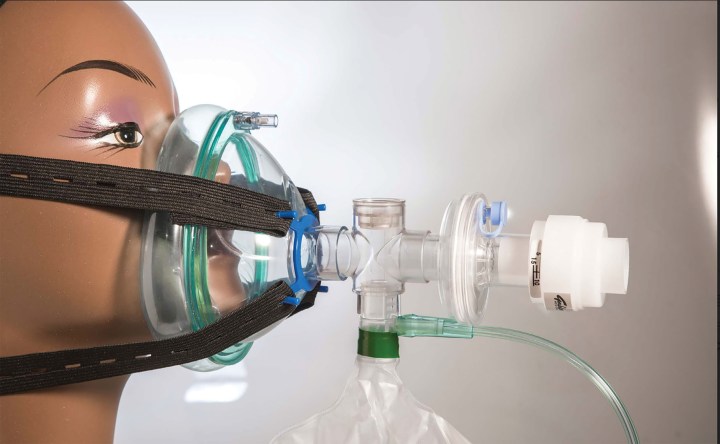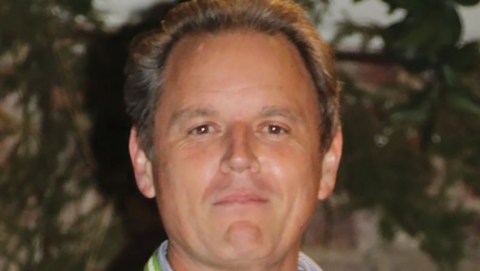COVID INNOVATION
Eastern Cape doctor’s engineering brainwave saved hundreds of lives during pandemic

Dr Craig Parker created an oxygen device that was an important lifeline to patients in rural Eastern Cape at the height of the Covid-19 pandemic. He is 2022 Rural Doctor of the Year.
Dr Craig Parker’s oxygen device – the OxERA – saved hundreds of lives during Covid-19, particularly in the rural Eastern Cape. Now, it has earned a global nod, being listed in the World Health Organization’s 2022 Compendium under “innovative health technologies for low resource settings”.
A brochure describes OxERA as an “all-in-one device using an oxygen accumulator bag, an anaesthetic mask and an adjustable mechanical peep valve (a spring-loaded valve against which the patient exhales) that is cost-effective and oxygen efficient”. The device requires an oxygen source, but uses less oxygen than traditional ventilators and is simpler to operate.
With a background spanning mechanical engineering and medicine, Parker pioneered the idea for OxERA in March 2020.
Building solutions
Practising as an anaesthetist at East London’s Frere Hospital, he says: “I had been in the UK visiting my grandmother for her 100th birthday. The UK was collapsing and imploding with Covid. I realised that if they were not coping, then goodness, we were in trouble. And I felt ventilators were not going to fix our problem. To have somebody ventilated, you need a ventilator. You also need an ICU-trained [intensive care unit] nurse and space in an ICU. You need ICU-trained doctors. So I came back and I put a call out on Facebook for anyone who wanted to join me to try [to] build a solution.”
Quickly, a group assembled in East London. “I called in some of my mining buddies. We had De Beers loan us two engineers at one point. A colleague at Frere was helping me with some of the ICU stuff – Dr Brendan Toy. We were tossing ideas around, building prototypes, testing them. I think it’s the hardest I’ve ever worked – like 18 hours a day.” Eventually, their hard work paid off. Parker and his colleagues successfully used the device, preventing lung collapse and saving lives. Up the coast at Madwaleni District Hospital, where oxygen had to be ferried in by bakkie over two hours via rutted roads from Mthatha, desperate doctors welcomed the device too.

Dr Craig Parker. (Photo: Supplied)
“It was challenging,” says Parker. “The device was still a prototype we were testing, but healthcare workers were desperate and finding them useful and they were saving lives. So we were just making them and donating them to those who asked.”
Daily realities
Zimbabwe was so much worse, says Parker. “Really, if you were anything beyond mildly ill there, it was a death sentence. They had no hope of big, bulk oxygen supplies that could support high-flow nasal oxygen solutions. They didn’t have equipment or the skills to ventilate patients. And so they used OxERA devices a lot, through an NGO there called Kufema.”
Born in Harare, Parker’s father died in the Zimbabwean civil war in 1974, when Parker was two years old. A teacher, he’d trained as a paramedic for the army. “He was killed in a medical evacuation. At night, the plane crashed on takeoff.”
In 1981, Parker’s mother moved to South Africa, where she took a job as a laboratory technician at the University of KwaZulu-Natal (UKZN) in Pietermaritzburg.
In 1993, Parker completed a BSc in mechanical engineering at UKZN, after which he worked in mines in South Africa and Zambia. For a while, Parker, his wife Catherine, a nurse, and their two children lived in the Zambian Copperbelt town of Chingola. His distaste for what he describes as the “rich getting richer” ethos of mining started to wear him down.
A ‘midlife crisis’ and a Leatherman
In 2011, at the age of 39, a “midlife crisis” saw Parker rethink his career. The following year, he enrolled in medical school at the University of the Witwatersrand. Practically, he says this felt “ridiculously impossible” – financially and time-wise. But with his wife’s support, he made changes.
“I was only able to graduate because the medical school actually paid my fees. Everything was maxed out.”
Read more in Daily Maverick: “Women in Health: ‘I don’t like seeing anybody treated unfairly,’ says new head of HIV Clinicians Society”
A two-year internship at Frere Hospital followed. Then a year of community service at Victoria Hospital in Alice, in the rural Eastern Cape, where Parker “used [his] Leatherman to fix things as much as his stethoscope”. Back at Frere, he worked in paediatric surgery and then in anaesthetics.
Ubuntu in the Eastern Cape
On healthcare challenges in the Eastern Cape, he says: “It’s a very challenging province because it’s a province that for so long was neglected, for decades really. And then once democracy came, it sort of continued along that trend… And so we top the lists of poverty, of everything negative really. It’s quite difficult to reinvent that.”
Visit Daily Maverick’s home page for more news, analysis and investigations
He points out the galvanising effect of disaster. “But one thing is, it’s quite a homogenous province. So it’s mainly isiXhosa-speaking people and there’s a great sense of unity. [And] amongst that disaster and crisis, a sense of we’re all in it together. And I think that really shone through if you think of Covid. I guess ubuntu is probably stronger in the Eastern Cape than anywhere else. There were some people, the darker it got, the brighter those stars shone.”
Democratising healthcare technology
In December 2020, the South African Health Products Regulatory Authority approved the OxERA device for emergency use. It is being made and distributed by Gabler Medical in Cape Town and Umoya, a “social enterprise model” company; all profit is ploughed back into the project.
Parker says they want to set a precedent in democratising healthcare technology. “So our original plan was to create a design that was open source so that anyone could [3D] print their own unit. But that’s not how the medical device world works. We realised that there is regulation for a reason.
Read more in Daily Maverick: “A TB scientist’s remarkable journey from a Cameroon village to a Stellenbosch University research lab”
“So we set up and registered a company called Umoya, a social enterprise… What it means is that your business is not set up for a traditional capitalist objective, but a social objective,” he explains.
“Usually, companies exist to create shareholder value. [With] our product, the profits go straight back into the company. We think this is a new, sustainable model for medical devices in the developing world because of the massively growing gap between fancy new stuff that’s revolutionising healthcare, but which is completely out of reach for the majority of people who need it.”
‘Rural Doctor of the Year’
Earlier this month at the Rural Health Conference in Oudtshoorn, Parker received the Rural Doctor of the Year Award for 2022, a title bestowed annually by RuDASA, the Rural Doctors Association of Southern Africa. RuDASA said: “Dr Parker’s leadership, knowledge, and understanding of engineering, clinical, and social fields was instrumental in the development of the OxERA product. He continues to provide leadership at Umoya, as they have been asked to assist with a number of other innovations to improve healthcare, specifically in resource-constrained environments.”
During the interview, Parker’s sentences have a self-deprecating bent. “Perhaps I am an average engineer, and an average doctor,” he says. “But this combination of skills is quite unique, and they were hugely beneficial during Covid.” DM168
For more detail on the device, see this video on the Discovery website.
This article was published by Spotlight, health journalism in the public interest.
This story appeared in our weekly Daily Maverick 168 newspaper, which is available countrywide for R25.

DM-01102022-001-1
"Information pertaining to Covid-19, vaccines, how to control the spread of the virus and potential treatments is ever-changing. Under the South African Disaster Management Act Regulation 11(5)(c) it is prohibited to publish information through any medium with the intention to deceive people on government measures to address COVID-19. We are therefore disabling the comment section on this article in order to protect both the commenting member and ourselves from potential liability. Should you have additional information that you think we should know, please email [email protected]"




 Become an Insider
Become an Insider